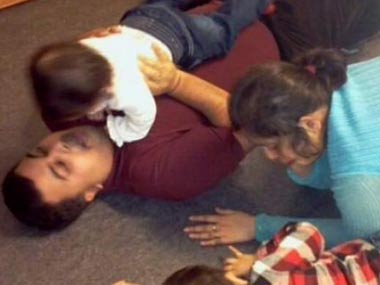Close to a year after they were taken from their parents’ custody, a Norwegian court on Tuesday could decide whether the paternal uncle of NRI children Aishwarya and Abhigyan Bhattacharya will finally get their custody and be able to return with them to India. The last hearing on the children’s custody on 23 March did not take place after a physical argument between the parents of the children, Sagarika and Anurup Bhattacharya, in which the latter accused his wife of physical violence and hiding a psychological condition. Following reports of discord between the couple, the local Child Welfare Services had said the grounds for signing the earlier agreement no longer existed and had said they would not transfer the custody of the children to their paternal uncle Arunabhash. [caption id=“attachment_277737” align=“alignleft” width=“380” caption=“The custody of the children could be handed over to their paternal uncle. Screen grab from CNN-IBN”]  [/caption] The parents had on 21 March in the agreed in the presence of an official of the Indian embassy that the custody of the children should be handed over to Arunabhash. The Child Welfare Services of the local municipal body in Stavanger had then agreed to give the custody of the children to their uncle, and if accepted by the court he can return to India with them. “If the court decides that the children should be removed from the care of the public authorities, the agreement can be implemented as soon as practicable. The uncle will then take over care of the children and take them back to India,” a press release issued by the Stavanger municipal body had stated. The children, three-year-old Abhigyan and one-year-old Aishwarya have been in the custody of the Norwegian Child Welfare Services since May 2011. Their case has seen many twists with the Indian government even sending a special envoy to negotiate on behalf of the parents and seeking the transfer of custody of the children to their uncle. However, the Indian government has played a more subdued role after reports of marital discord between the parents emerged. While some have seen the incident as a case of state excess in intervening in the private life of an immigrant family, Ombudsman for children in Norway, Reidar Hjermann told Firstpost said that Norwegian authorities have run into similar controversies with governments of Turkey, Poland and Russia over custody of children. “There are no standard procedures in such cases, because there must be made individual considerations in each and every case. Children from other countries should be protected in the same way as Norwegian children against abuse and neglect,” he said. Among the factors the court could consider during it’s hearing would be the possible separation between the childrens’ parents. However, with the case looking like it could come to a close, Hjermann said local child welfare services would need to develop their capabilities to handle similar cases better in the future. “I understand that family troubles are more a private matter in many other countries, also India. We could probably learn from other countries more about the value of the extended family,” he said. “Still, I think that the CWS should continue to support families and children at risk, and intervene when necessary. Because we are increasingly becoming a multicultural society, the CWS and other public services should develop their multicultural competence, and they should have been more considerate using interpretation and translation when communicating with parents of foreign origin,” Hjermann said.
The local child welfare services has agreed to hand over the children to their paternal uncle who can return to India with them. The children have spent close to a year in the care of Norwegian child welfare services.
Advertisement
End of Article


)

)
)
)
)
)
)
)
)



